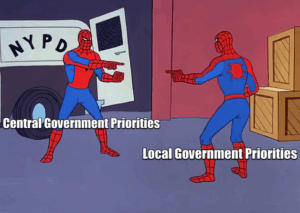Over the last six months I’ve been on a secondment to the heart of government, the Cabinet Office, after 20 years working in local government across the Essex partnership. I’m here to unequivocally answer the question on everyone’s mind, the one I’ve been asked several hundred times by both parties over the last year, ‘which is better? Central or local government?’
And what better way to answer that question then through the medium of a rap battle between Local-Gov me and Central-Gov me, strap in, things are about to get spicy…

I am of course not going to be doing that! Whilst I may well write here in the style of a rap battle I shan’t be attempting in any way to pass judgement on any governmental preferences for risk of offending everyone. Instead, I’ll write some delicately phrased observations that will arrive at the all too predictable conclusion that ‘collaborating better is the holy grail’ and we’ll all nod our head in agreement, no one is offended, and we’ll forget about it quickly and get on with our daily jobs.
But why does that happen? If the collaboration we all know we need is Central G and Local Gov (feat. Da TaSharin’) then why doesn’t it happen regularly and consistently? In my opinion some of the reason for this can be found through looking towards the ‘motivational cat-poster-I-don’t-manage-time-I-manage-people’ site LinkedIn. Our professional networks are often very localised and shallow – you’ll probably find the majority of connections you have are within your own organisation, and a large slice of them you most likely rarely engage with.
I had no central government connections six months ago, but throughout my 20 years of working every time I have met someone inspiring, or supportive, or someone that makes me think differently I have endeavoured to maintain contact with them. I’d encourage everyone to broaden their network parameters, expanding the reach and focussing on deeper meaningful relationships (smaller, simpler, specialised*).
*one for my Cabinet Office homies.
In my last few weeks in the Cabinet Office I threatened loads of people that I will ‘be in touch’. They nodded their head politely and possibly shrugged this off like when a couple you meet on holiday say “let's keep in touch” – but as a few people know already (and others will soon see) like a bad penny I will turn up in your inbox (or gatecrash your next holiday).
I’m not just doing that for the sake of it, yes, it's lovely to hear from people on a personal level, but on a professional level local and central government are more similar than different (p<=0.05).

My role in the Cabinet Office was Head of Analysis, Research, and Evaluation – but that also covered Data Science and Artificial Intelligence. My role in Essex County Council covers the identical professions. The nature of the work across both was very similar, and the tools available were identical – theoretically outputs, impact, and ways of working would therefore also be similar right? For the most part, yes, but if I was going to create a gold standard piece of intelligence work it would be (rather predictably again) a hybrid Frankenstein-esque beast, cherry picking different things from the respective teams.
My colleagues in the Cabinet Office were simply wonderful, and were so welcoming to me upon arrival, and sincerely kind upon my exit – but a phrase that people said a disproportionate number of times was to refer to me as a “breath of fresh air”. This was only intended to be complimentary, but another way of interpreting that is that I wasn’t the typical civil servant. Which is a fair comment, I don’t feel like a typical civil-ian to be fair, and at times I felt like the Odd Dog Out.
Mostly because I would talk about obscure children’s books like Odd Dog Out (a tale/tail of a dog that isn’t typical, and in his quest to fit-in realises being different should be celebrated, which then inspires other dogs to embrace their own uniqueness).

I think (hope) that the main message I left behind was that data, research, and analytical work can be conducted and communicated in different ways. Colleagues in Essex present beautifully crafted data stories and talk about them passionately, which always leaves me engaged and enthused – but this also serves another purpose, engaging and enthusing non data professionals.
There are several things I stole from the Cabinet Office to bring back to local government too (conceptual things! Before I am arrested).
There are fantastic well-established governance and processes in place that ensure all Cabinet Office work is impactful and robust. This prevents considerable time and resource being spent on things that aren’t possible/valuable and latterly ensures accuracy and confidence in outputs to take desired actions. (Whilst quite intimidating going through these gateways, which are all published/transparent, they were incredibly productive).
At the end of the day, I can’t really generalise all the Civil Service from a short stint with one team, and I can’t generalise all local government based on one county council – but I guess the point is that by being exposed to different teams/environments is mutually beneficial, especially teams with hundreds of shared goals. I learnt more in the 6 months organically than the previous six years.
As well as expanding professional networks, I’m going to outline what we can all do as individuals to facilitate a collaborative environment, with a hope that more people from local government get the opportunity to work in (or with) the civil service, and vice versa:
Learning
Most organisations state that ‘10% (+) of time can be taken for dedicated learning’. Learning can happen in lots of ways and doesn’t have to just be structured technical courses. That time could be used hearing from someone in similar professions in different organisations. Seeing how different people and teams approach similar challenges will be either reassuring (“yeah, we do something similar”) or potentially transformative (“oooh, I hadn’t thought about doing it that way”).
Sharing work/materials
‘Steal with pride’ was a phrase often used in Cabinet Office and believe me I’m going to have more pride than a pride of peacocks with the number of things I will be ‘stealing’. Stealing is such a harsh word though, and to be absolutely clear that isn’t what’s occurring here. The Civil Service is truly transparent, you will be able to find detailed information on all of its work, to enable you to replicate it – and that’s because they want you to. I’m definitely an advocate for open sourcing code/work. That doesn’t mean you should simply go “let’s just copy what (e.g.) Somerset have done”, still formulate what you want to achieve yourself first, but then look at how others have approached similar issues and see what learning can be taken from them.
This year or the next, the 100,000th piece of work (research or statistical release) will be published on gov.uk. If any of the releases on here tickle your fancy and you’d like to hear more, contact them! People LOVE talking about their work!
Communities of Practice, Networks, and Events
There are so many fantastic data professional networks and communities of practice (CoP). I must admit that I feel the Civil Service can sometimes be its own little bubble, and a few years ago when I discovered various CoPs within central government I ‘sort of’ just invited myself along to them, and like a houseguest that never leaves and drinks all your lemonade I’ve been drinking in the collective knowledge ever since. I’d encourage everyone to open their community/event doors from time to time, and even actively seek to invite professionals from outside your immediate network.
The Government Data Science Slack channel is a great place to hear about the wide range of professional events, discussions, networks, and communities. It’s available to all local government employees, just sign in using your “gov.uk” email address!
And never be afraid to explicitly ask organisations about secondment opportunities. These situations are mutually beneficial for all parties, so you’ll more often than not be met with incredible support.
Shared Priorities
Lastly, at a system level, in my last months at Whitehall I went on the offense, and at any given opportunity would emphasise that the government missions cannot be achieved without local government input:
“Stephen, we really need that report asap, what’s taking so long, this is hardly mission impossible.
“Speaking of missions, ‘government missions can’t be achieved without the input from local government’
“What was your secondment end date again?”
It’s not just the government missions that would benefit from closer collaboration and more regular conversations. Whilst I was at the Cabinet Office, Angela Rayner announced a secondment scheme between the civil service and local government in order to support devolution. A fantastic idea. But I personally don’t believe there should have to be some sort of huge transformational programme to be the catalyst for central-local government secondments, it should be BAU.
To conclude my secondment experience and comment on what I’ve learnt, I am keen to try and create some sort of cross governmental coalition of the willing. I’ve never been more confident that the ‘willing’ part is there, which is half the non-rap battle.